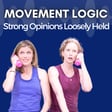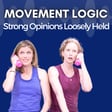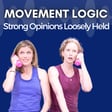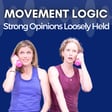
112: Redefining What’s Possible – Lift for Longevity Alums Share Their Stories
Welcome to Episode 112 of the Movement Logic Podcast! In this special episode, Laurel and Sarah talk to four women who recently completed Lift for Longevity about their experiences. Whether it’s overcoming fear of injury, finally finding a program that sticks, breaking free from perfectionism, or realizing barbells belong in their hands, each woman brings a unique and inspiring story.
In this episode, you’ll hear from:
Karen Klubertanz, an interior designer and yoga therapist who came to us after chronic back pain and years of yoga and kettlebells. Her story is about overcoming fear, learning to train with RPE, and discovering she could get stronger safely and sustainably.
Anna Grojec, a freelance writer and editor in New Jersey who found us through the podcast and has now completed the course twice, entirely asynchronously without ever taking a live class. Her story is about making strength training stick for the first time in her life through structure and community support.
Terry Littlefield, a longtime yoga teacher and old friend of Sarah’s who came in skeptical, took our free class, and realized she had to join. Her story is about shifting from perfectionism to consistency and finding confidence under the barbell.
Janai Leeb, a personal trainer in northern Los Angeles County who first got the impression in her PT cert that barbells weren’t for her. She joined to build her own barbell skills and now teaches them to her clients. Her story is about finding her lane with the barbell and showing others that anyone can lift, at any age.
If you’ve ever wondered if you’re too old, too inexperienced, or too "not a gym person" to lift barbells and get stronger, these conversations will change your mind.
SIGN UP for our FREE CLASS for Bone Density Course on October 17th WITH REPLAY
FOLLOW @MovementLogicTutorials on Instagram



